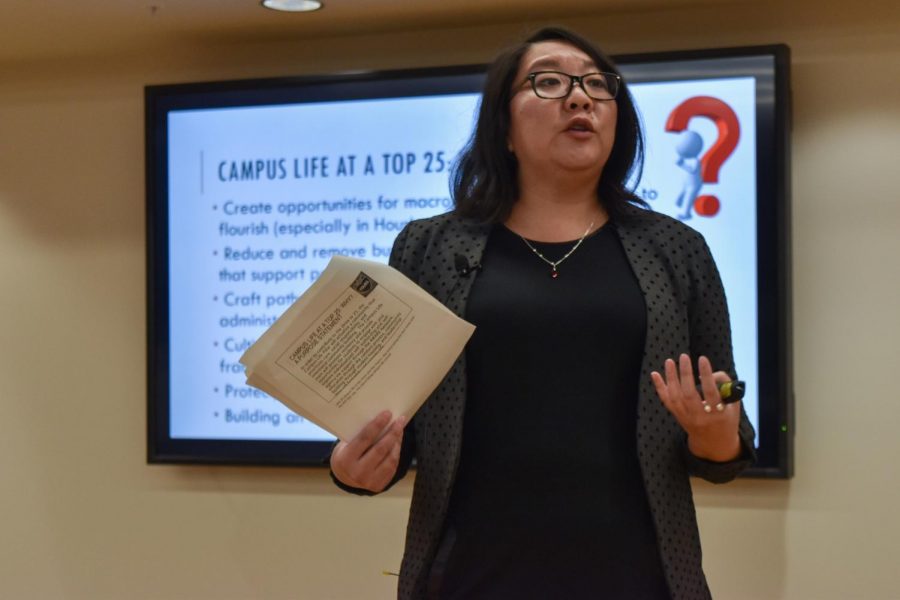AVP finalist shares goals for WSU, students
Candidate advocates for transparency, has goal to collaborate with campus
JENIN REYES | THE DAILY EVERGREEN
Jill Creighton, a finalist for vice president of campus life/dean of students, talks about her experiences in student affairs and her plans Monday evening in the Chinook Student Center.
November 6, 2018
The third finalist for the future WSU associate vice president for campus life/dean of students position visited campus Monday to speak about her motivations for applying, her motto for helping WSU grow and future plans for campus.
Jill Creighton, who is currently assistant dean of students for conduct and operations at the University of Oregon, is a Washington resident with ties to WSU.
“I am a Washingtonian, this is my home state,” she said. “I have been told many, many years how much of a joy [WSU] is and the joy it brings.”
Creighton said standing by students is a priority to her. She wants to work alongside them and ensure their voices are heard. This, she said, is the process of meeting students where they are at.
“I’m very student-driven in the way that I try to make decisions,” she said. “I want to hear directly from our students.”
She said student advocacy will extend to employing students to serve on an advisory board in tandem with the Student Affairs office. She said those students being paid a work study hourly wage will be heard from on a regular basis.
“What [students] do matters,” she said.
Creighton said because she currently works in an office where she shares her first name with another employee, a joke has been facilitated by her staff in Oregon. The play on words falls in line with her motto in regard to student conduct, she said.
“It takes a Jillage to support students,” she said.
Creighton said transparency is vital in any department. Being open and honest about the functions of any institution allows professionals to grow and build trust within their peers, she said.
“In the absence of information, people tend to make up their own information,” she said. “It’s incredibly important to share when we can.”
Creighton said Students Affairs should be viewed by students as a beacon for any matters they might have.
“What I want [is for students to] think ‘This is the place where I go for help,’ ” she said.
Creighton said intentional community-building is one of the goals she wants to implement first. The identity of many students often stems from where they live or what they are involved with, she said.
She said this is evident in examples such as identifying as a member of Greek Life or as a resident of a Stephenson tower. Facilitating open environments would allow for these separate groups to come together, she said.
“It is not our job to make friends for our students,” Creighton said. “But it is our job to create spaces where students can find friends.”
She said cultivating a culture of intentional inclusion is a priority and communication is a tool to achieve this goal.
“We are working to understand one another through difficult dialogue,” Creighton said.
Her motto for helping WSU grow beyond the top 25 public research universities is described through a simple acronym: BRAINS, she said. The acronym states that in order for WSU to be successful, the entirety of the school and its people need to be bold, responsive, assessment-guided, individualized, nimble and socially just.
“Being bold is encouraging students to try things that maybe scares them a little bit,” she said.
BRAINS will operate as the core values Creighton said she wants to implement. It is multi-tiered and will need an effort to be made on everyone’s part.
“The worst thing is [when] we learn something that didn’t work,” she said. “The best thing that can happen is [when] we learn an approach that others can possibly take.”
With the current digital age, a response is expected to be received almost immediately after contact is made, she said. A timely response is usually given on platforms such as social media, so it should not be unreasonable to expect the same thing from an educational institution.
“For faculty, being responsive means reaching out within one business day,” Creighton said. “We owe our faculty partners that response time.”
Using data to make decisions in WSU and its students’ best interests belongs in the assessment-guided category, she said. Measuring student engagement and success is part of that group.
Individualizing methods for each student is necessary to fit their needs, Creighton said. Regardless if a department has seen the same issue in 50 different ways, she said it needs to be approached as if it is the first. She said many times it is the first issue the student involved has faced.
“We should be able to connect the student to the resources they need,” Creighton said.
Being nimble is to be flexible, she said. This will forward the mission of improving and allowing for WSU and its students to grow.
“We can’t cope with the crisis for the student,” she said. “What we can do is remove barriers so that their navigation of that crisis is as easy as possible.”
Creighton said being socially just is the ability for everyone to recognize they may have biases they are not aware of. Accepting that identities are not the same for every individual is part of this, she said.
“It’s a hard conversation to have because we all have our biases,” Creighton said. “But it is really important because now we are able to work on ourselves while we are working on our students.”
Continuing a dialogue with partners within WSU’s community is the goal of BRAINS, she said. This will lead to understanding, acceptance and the growth of WSU, its students and its community.




















